 klaus-michael schneider
klaus-michael schneider
Keywords: education |
Links: FOTW homepage | search | disclaimer and copyright | write us | mirrors

Last modified: 2021-08-26 by  klaus-michael schneider
klaus-michael schneider
Keywords: education |
Links: FOTW homepage |
search |
disclaimer and copyright |
write us |
mirrors
See Also:
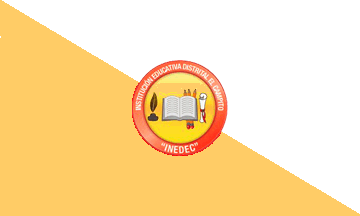 image by Ivan Sache, 12 October 2018
image by Ivan Sache, 12 October 2018
IED El Campito (INEDEC) was originally established by ICCE in March 1974 in
borough El Campito, Baranquilla (Atlantico Department), as Escuela No. 30 Mixta,
to be renamed in 1994 to Centro de Educación Básica No. 83.
The flag of
INEDEC is diagonally divided ber bend white-ocher, with the school's emblem in
the center.
White represents the values of understanding that allows living
together, such as peace, tolerance, humility, obedience, control, order,
kindness, respect, gratitude, justice, solidarity, among others.
Ocher yellow
represents the human resources:
- intellectual resources, an array of
acquired knowledge that allow not only to progress in work and study but also to
better perceive the surrounding world, accepting that everyone thinks
differently.
- effective resources, as the possibility to love and to be
loved, thus improving our lives with family, friends and at school.
- moral
resources, which allow to gain autonomy on several matters, commitment and
dignity, speaking with frankness and sincerity to other people.
http://iedelcampito.edu.co/simbolos/
INEDEC website
Ivan Sache, 12 October 2018
 image by Ivan Sache, 29 June 2014
image by Ivan Sache, 29 June 2014
Colegio El Carmelo is located in Bogotá.
The flag of the institute is horizontally divided white-coffee brown. White is a
symbol of purity. Coffee brown is a symbol of austerity, and also the colour of
the Carmelite cloak.
Source:
http://www.colegioelcarmelo.edu.co/quienes-somos/nuestro-colegio/escudo-simbolo-himno
- Institute's website
Ivan Sache, 29 June 2014
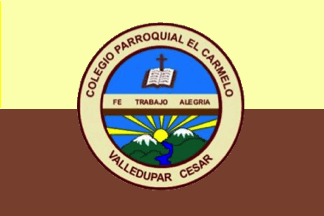 image by Ivan Sache, 11 December 2020
image by Ivan Sache, 11 December 2020
Colegio Parroquial El Carmelo is located in borough El Carmen, Valledupar
(Cesar). The Nuestra Señora del Carmen parish was erected on 10 April 1970 by
Bishop Vicente Roig y Villalba (1969-1977), who appointed Father Rafael Calixto
Daza Díaz as the first parish priest.
The priest established a primary
school, which was upgraded to a secondary school by Decree No. 23 issued on 29
November 1977 by the Diocese of Valledupar.
http://colcarmelo.edu.co/
School
website
The flag of Colegio Parroquial El Carmelo is horizontally divided
beige-dark brown with the school's badge in the center.
Beige is the
symbol of the open-minded and loyal attitude of humans (parents, teachers and
students) towards God's truth.
Dark brown reflects the attitude of a human
who has discovered that to reach light someday, he has to get rid of his own
criteria of a man who lives and acts as if God did not exist.
The badge's
general shape symbolizes generations of good feelings, inscribed with the
school's full name. Its upper part features a cross, as a symbol of the Roman
Catholic Christian, who is prepared to accept his cross as an efficient means to
achieve his conversion. The cross is supported by an open book representing:
- The Scripture, always open to teach the new man so required by mankind;
-
The child, the young, as an open book in which we (the church, the parents, the
educators) sow for harvest.
The middle part is inscribed with the Carmelite
motto "FE, TRABAJO, ALEGRÍA" [Faith, Work, Glee]. In the second, lower half, is
featured a rising sun meaning "When the sun rises over the horizon, everything
is flooded with glee: the soil, the plants, the birds, and even man feels the
heat.
http://colcarmelo.edu.co/index.php/nuestro-colegio/simbolos
School
website
Ivan Sache, 11 December 2020
 image by Ivan Sache, 11 December 2020
image by Ivan Sache, 11 December 2020
Institución Educativa Colegio el Carpinelo was established on 12 March 1977
as Centro de Capacitación Técnica "Hogar del Niño", to be renamed to
Bachillerato Técnico "Nuestra Señora del Carpinelo". The school was merged with
Escuela Padre Arturo D'Onofrio and Centro de Orientación Vocacional "Spernadeo
Urrea" by Resolution No. 876 issued on 7 May 2003 to form Institución Educativa
el Carpinelo, to be renamed to Institución Educativa Colegio el Carpinelo on 13
December 2007.
The school is managed by the Missionaries of the Divine
Redemption, a congregation founded by Father Arturo D'Onofrio (1915-2006). Also
founder of the Small Apostles of Redemption in 1948, D'Onofrio went to Colombia
in 1971. He subsequently founded schools in Guatemala, El Salvador, India,
Mexico, Costa Rica and Peru.
The school is named for Maria Santissima
Consolatrice del Carpinello, the advocation of the Blessed Virgin venerated in
Visciano (Province of Naples, Italy), D'Onofrio's birth town.
The flag of
IE Colegio el Carpinelo is horizontally divided blue-gray-white.
Blue
represents Marian devotion, the immensity and deepness of the knowledge of God,
of the universe, and of man.
Gray represents the student's technical
diversity, commitment to work and work willingness.
White represents the
educational community's purity and virtue. It is God's invitation to felicity
for all human beings.
Manual de Convivencia Escolar
https://media.master2000.net/menu/147/5291/mper_60359_MANUAL%20DE%20CONVIVENCIA%202019.pdf
Ivan Sache, 11 December 2020
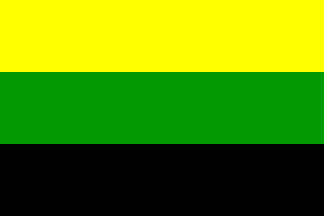 image by Ivan Sache, 6 March 2017
image by Ivan Sache, 6 March 2017
Institución Educativa El Castillo is located in Barrancabermeja,
Santander Department.
The flag of the institute is horizontally divided
yellow-green-black.
http://www.castillo.edu.co/index.php/institucional/simbolos - Institute's
website
Ivan Sache, 6 March 2017
 image by Ivan Sache, 01 September 2017
image by Ivan Sache, 01 September 2017
Institución Educativa El Cusiana is located in Tauramena (Casanare). The
institute is made of the principal seat, located in El Cusiana, and of another
four seats located in La Iquía, San Carlos, Los Yaguaros and La Primavera.
The flag of I.E. El Cusiana is horizontally divided yellow-green with a white
triangle placed along the hoist and ending at the fly's midpoint.
Source:
Institute's website
Ivan Sache, 01 September 2017
 image by Ivan Sache, 20 August 2017
image by Ivan Sache, 20 August 2017
Institución Educativa El Diamante was established in 1952 in Pamplonita,
Norte de Santander.
The flag of I.E. El Diamante is horizontally divided
light blue-dark green. The blue stripe is charged with a yellow rising sun and
there is a white human silhouette in the center of the flag.
The flag was
designed by the director of the institute, Carlos Julio Peñaloza García, based
on several proposals submitted by teachers and students of the institute.
The flag is prescribed in size 1.40 m x 1.80 m (proportions 7:9). The
arrangement of the stripes represents the geographical context of the
institute. Blue represents the infinite horizon, while green represents the land
and the natural environment. The length of the sun is 1/3 of the flag's length.
The sun is a symbol of the light that irradiates knowledge and enlightens the
life of every member of the educational community. The silhouette represents the
students, the teachers and the parents, who constitute the community. White is a
symbol of faith, loyalty and aspiration to peace.
http://institucioneducativadiamante.weebly.com/siacutembolos-institucionales.html
- Institute's website
Ivan Sache, 20 August 2017
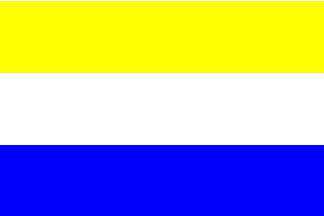 image by Ivan Sache, 08 November 2014
image by Ivan Sache, 08 November 2014
Colegio El Divino Niño was established in 1960 in Santa Marta (Magdalena
Department) by Berta Riascos de Delvalle.
The flag of the institute is horizontally divided yellow-white-blue. Yellow is a
symbol of intellectual resources and of knowledge. White is a symbol of the
student's spiritual values. Blue is a symbol of the academic, religious,
cultural, artistic, and sporting spirit of the students.
Source:
http://colegiodivinonino.edu.co/index.php?option=com_content&view=article&id=145&Itemid=654
Ivan Sache, 08 November 2014
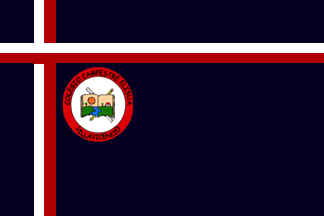 image by Ivan Sache, 30 September 2018
image by Ivan Sache, 30 September 2018
Colegio Campestre Elisua is located in Villavicencio (Meta Department).
The flag of Colegio Campestre Elisua is shown in Article 103 of the
school's Manual de Convivencia. Blue represents the universe, water and life.
Red represents joy, dynamism, enthusiasm experienced by every member of the
institute. White represents peace and harmony present in the heart of every
member of the institute.
The coat of arms of Colegio Campestre Elisua
is shown in Article 118 of the Manual de Convivencia. The circles that
form the coat of arms represent protection offered to the children, as part
of their education to life. Red, placed between the circles, represents joy,
dynamism, enthusiasm experienced by every member of the educational
community. White represents peace, tranquility, harmony in the work
transmitted to the whole educational community. The pencil, the ruler and
the book represent the academic education acquired in the institute. The
landscape proper to our region represents love of God, of the homeland, of
the family and of the environment.
http://colegiocampestreelisua.edu.co/data/documents/MANUAL-DE-CONVIVENCIA-CCE.pdf
Manual de Convivencia
Ivan Sache, 30 September 2018
 image by Ivan Sache, 17 October 2014
image by Ivan Sache, 17 October 2014
Escuela Normal Superior El Jardín de Risaralda is located in El Jardín
borough, part of the municipality of Pereira (Risaralda Department).
The flag of the institute is prescribed in the institute's Etiquette
Guidebook as horizontally divided yellow-white-green.
Yellow is a symbol of resources and capacity in institutional growth
through pedagogy, humanities, and science. Yellow represents the light
that guides the path of the new teachers appointed by Colombia for the
education of its children.
White is a symbol of the clarity of philosophical, pedagogic, and
scientific thinking.
Green is a symbol of hope. The green stripe is the sum of the yellow
and white stripes, as a symbol of integration of the children and the
teachers.
Source:
http://normalsuperiorisaralda.edu.co/contenido-manual-de-convivencia-27.html
Ivan Sache, 17 October 2014
 image by Ivan Sache, 16 January 2009
image by Ivan Sache, 16 January 2009
"Colegio El Jazmín" is located in Bogotá, in the
borough of Puente Aranda, named after a bridge built in the 16th
century on a marshy plot near river Chinua, then owned by Juan de
Aranda.
The flag of the institute, as shown graphically on the website
of the institute, is white with a green border.
Ivan Sache, 16 January 2009
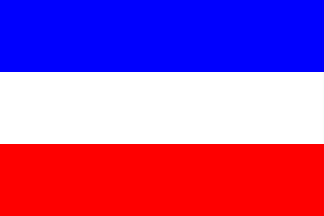 image by Ivan Sache, 08 September 2014
image by Ivan Sache, 08 September 2014
Institución Educativa El Mamón is located in the village of El Mamón, part of
the municipality of Corazol (Sucre Department).
The flag of the institute is horizontally divided blue-white-red.
Source:
http://www.ieelmamon.corozal-sucre.gov.co/es/inicio - Institute's website
Ivan Sache, 08 September 2014
"Colegio El Minuto de Buenos Aires" is located at
Bogotá.
The flag of the institute,
as shown graphically on the website
of the institute, is horizontally divided white-light blue
with six yellow stars placed in an ascending diagonal pattern,
with increasing size from bottom to top.
Ivan Sache, 27 January 2009
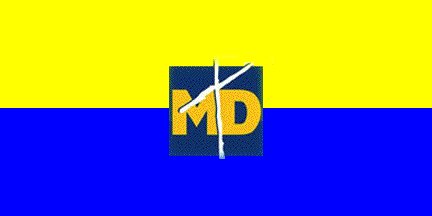 image by Ivan Sache, 10 March 2017
image by Ivan Sache, 10 March 2017
Colegio El Minuto de Dios originates in a school established in 1958 in the
El Minuto de Dios borough, Bogotá. Father Rafael García Herreros Unda
(1909-1992) founded there the Corporación Educativa Minuto de Dios, which
manages 24 educational institutes all over Colombia.
The flag of the
institute is horizontally divided yellow-blue with the emblem of Corporación
Educativa Minuto de Dios in the center. The emblem is made of blue rectangle
charged wit the golden yellow letters "MD" and a white cross.
http://www.colegiosminutodedios.edu.co/el-minuto-de-dios/index.php/quienes-somos/nosotros/simbolos
- Institute's website
Ivan Sache, 10 March 2017
They also have a University, called "Corporación Universitaria Minuto de
Dios" (shortened "UniMinuto") (official website:
http://www.uniminuto.edu) (additional
information here:
https://es.wikipedia.org/wiki/Corporaci%C3%B3n_Universitaria_Minuto_de_Dios)
The name derives from a tv spot called "El Minuto de Dios" (God's Minute)
sponsored by the Corporación Minuto de Dios (official website:
https://www.minutodedios.org) (an NGO
of Catholic origin), which airs on weekdays, before the 7 p.m. local news
broadcast on both private channels (channel 7 and channel 9).
Esteban
Rivera, 10 March 2017
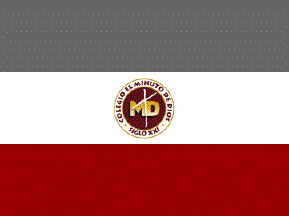 image by Ivan Sache, 10 March 2017
image by Ivan Sache, 10 March 2017
Colegio El Minuto de Dios Siglo XXI originates in Colegio El Minuto de Dios
Calendario B, established in 1984 in, Bogotá by Luis Carlos Mendoza. Corporación
Educativa Minuto de Dios, founded in 1958 by Father Rafael García Herreros Unda
(1909-1992), manages 24 educational institutes all over Colombia.
http://www.colegiosminutodedios.edu.co/sigloxxi/index.php - Institute's
website
The flag of the institute is horizontally divided gray-white-dark
red with the institute's emblem in the center. The emblem is made of a dark red
disk charged with the golden yellow letters "MD" and the white cross featured on
the emblem of Corporación Educativa Minuto de Dios
http://www.colegiosminutodedios.edu.co/sigloxxi/index.php/es/quienes-somos/nosotros/simbolos
- Institute's website
Ivan Sache, 10 March 2017
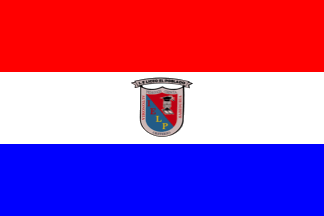 image by Ivan Sache, 11 October 2018
image by Ivan Sache, 11 October 2018
Liceo Bilingüe El Poblado is located in Pereira (Risaralde Department).
The flag of Liceo Bilingüe El Poblado is horizontally divided red-white-blue
with the school's coat of arms in the center.
http://lbelpoblado.com/manual_de_convivencia.php
Manual de Convivencia
Ivan Sache, 11 October 2018
"Colegio El Porvenir" is located in Bogotá.
The flag of the institute, as shown on a photo available on the website of the
institute displayed between the flags of Colombia
and Bogotá (with a small coat of arms),
is horizontally divided white- green with a triangle horizontally
divided yellow-red (recalling the flag of Bogotá) placed along
the hoist and the emblem of the institute in the middle. The
emblems seem to have the same size on the three flags.
The emblem of the institute is a red disk with a yellow border,
filled with the stylized letters IED / EP. "IED" stands
for "Institución Educativa Distrital", the official
name of all the institutes of that kind located in the Federal
District of Bogotá. However, most of them seem to prefer the
old, simpler "Colegio" name, for common use.
Ivan Sache, 15 December 2009
 image by Ivan Sache, 04 August 2014
image by Ivan Sache, 04 August 2014
Liceo Pedagógico El Recreo is located in Bosa (Bogotá).
The flag of the institute is horizontally divided gray-white. Gray is a symbol
of independence, self-sufficiency, and self-control. White is a symbol of light,
surpassing, and knowledge.
Source:
http://liceopedagogico.wix.com/elrecreo#!bandera/cxht - Institute's website
Ivan Sache, 04 August 2014
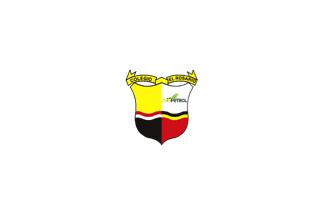 image by Ivan Sache, 21 September 2018
image by Ivan Sache, 21 September 2018
Colegio El Rosario was established in 1952 in Barrancabermeja, as Intercol
Staff School, for the children of the staff of Empresa Colombiana de Petróleos (Ecopetrol).
The national oil company, Ecopetrol, was established in 1951, succeeding the
Tropical Oil Company, which had initiated oil extraction in Colombia in 1921.
The college originally had two sections, one for the Colombians and one for the
foreigners.
The school was renamed to Colegio El Rosario in 1962; the plot
offered by Máximo Gómez to build the college belonged to the El Rosario estate,
placed under the protection of the Virgin of the Rosary. The school was managed
by Universidad Industrial de Santander, in partnership with Ecopetrol, from 1995
to 2000, and by the university alone, until 2001, when ceded to Asociación para
la Enseñanza (ASPAEN).
http://aspaencolegioelrosario.edu.co/
The flag of Colegio El Rosario
is white with the school's emblem in the center. White is a symbol of purity and
peace.
The coat of arms is of Spanish shape, as a tribute to Spain and to
the coat of arms of Colombia.
The first quarter, or, represents nobleness,
magnanimity, wealth, light, constancy and wisdom.
The second quarter, white,
represents purity, integrity, obedience, firmness, vigilance, eloquence and
triumph.
The third quarter, black, heraldically neutral, represents the oil
resources, a source of income and growth for Barrancabermeja.
The fourth
quarter, red, represents life, joy, dynamism, strength and energy.
The shield
is horizontally divided by wavy stripes, red and white in the left part, black
and yellow in the right part.
The shield is surmounted by a yellow scroll
inscribed with the school's name in black letters.
http://aspaencolegioelrosario.edu.co/index.php?option=com_content&view=article&id=53&Itemid=64
Ivan Sache, 21 September 2018
 image by Ivan Sache, 24 July 2014
image by Ivan Sache, 24 July 2014
Colegio El Rosario was established in San Gil (Santander Department) by the
Congregation of the Dominican Daughters of Our Lady of Nazareth. The
congregation, founded by the Colombian nun María Sara del Santísimo Sacramento
(1902-1980), was recognized locally on 30 March 1964, affiliated to the Order of
St. Dominic on 15 April 1964, and approved by the Holy See on 2 February 1975.
The flag of the institute is horizontally divided white-blue. The union of
the two colours is a symbol of the Eucharistic-Marian spirituality. White is a
symbol of purity and cleanness of the spiritual life fed by the Eucharist, the
Verb and the Christian Way of Life. Blue is a symbol of Mary.
http://www.colegioelrosario.com/index.php?option=com_k2&view=item&id=15:simbolos-institucionales&Itemid=133
- Institute's website
Ivan Sache, 24 July 2014
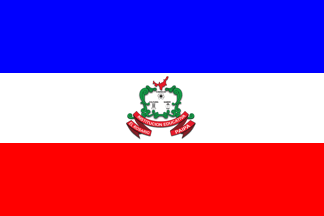 image by Ivan Sache, 3 January 2021
image by Ivan Sache, 3 January 2021
Institución Educativa El Rosario is located in Paipa (Boyacá).
The
flag of IE El Rosario is horizontally divided blue-white-red with the school's
emblem in the center.
https://www.elrosariopaipa.edu.co/mi-institucion/simbolos-rosaristas.html
School website
Ivan Sache, 3 January 2021
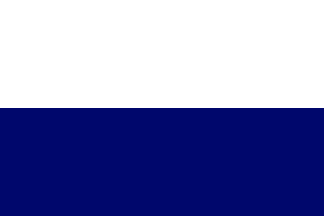 image by Ivan Sache, 20 August 2017
image by Ivan Sache, 20 August 2017
Institución Educativa El Salvador was established on 22 November 2002 in
borough San Salvador (center-eastern Medellín) by Departmental Resolution No.
16,377, as the merger of Escuela Especial El Salvador (est. on 8 February 1966
by Agreement No. 6) and Escuela José de San Martín (est. in 1959 by Resolution
No. 21).
The flag of I.E. El Salvador is horizontally divided white-dark
blue.
White is a symbol of peace, harmony and tolerance,
which are the values promoted by the institution.
Dark blue is a symbol of
force, integrity, enthusiasm and will, which are required to reach objectives.
http://master2000.net/recursos/menu/89/811/mper_arch_28237_V1-D01%20ACTUALIZADO%20PEI%2020151.pdf
- Proyecto Educativo Institucional, 2015
http://www.elsalvador.edu.co -
Institute's website
Ivan Sache, 20 August 2017
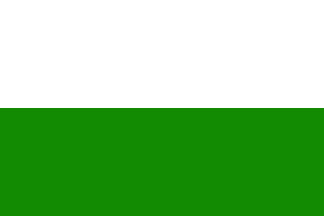 image by Ivan Sache, 17 June 2018
image by Ivan Sache, 17 June 2018
Institución Educativa Departamental Elvia Vizcaíno de Todaro (INDEVIT) is
located in Aracataca (Magdalena).
The flag of INDEVIT is prescribed in Article 9 of the Manual de Convivencia, as
follows:
The flag shall be composed of two horizontal stripes of equal height, white in
the upper part and green in the lower part.
White is a symbol of peace as the fruit of confraternity and pacific living
together, and also of the innocence and the mind purity of the institute's
children.
Green is a symbol of he richness of the flora and crops in our region, and also
of hope to have the institute's students converted into exemplary citizens.
Source:
Manual de Convivencia
Ivan Sache, 17 June 2018
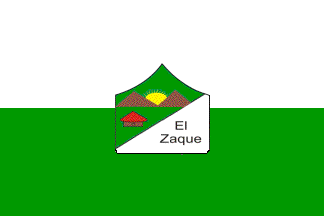 image by Ivan Sache, 03 November 2014
image by Ivan Sache, 03 November 2014
Escuela Rural El Zaque was established on 4 May 1992 in the village of El
Zaque, part of the municipality of Pasca (Cundinamarca Department). The school
is affiliated with Escuela Normal Superior Nuestra Senora de Incarnación, also
located in Pasca.
The symbols of the school, adopted on 4 May 2007, were designed by Jesús
Sánchez, from the Alto del Molino hamlet, who won the contest organized among
the parents.
The flag of the school is horizontally divided white-green with the school's
emblem in the middle. White is a symbol of purity, innocence, and peace. Green
is a symbol of the village's emblematic mountain and of the aspirations of the
farmers.
The emblem of the school is divided green-white according to the ascending
diagonal. The left part features the sun rising above Mount El Zaque, and,
beneath, a hut recalling the early inhabitants of the place. The right part is
charged with the name of the village.
Source:
http://normaldepasca.edu.co/wp-content/uploads/2011/07/Historia_Escuela_el_Zaque2008.pdf
- History of Escuela El Zaque
Ivan Sache, 03 November 2014